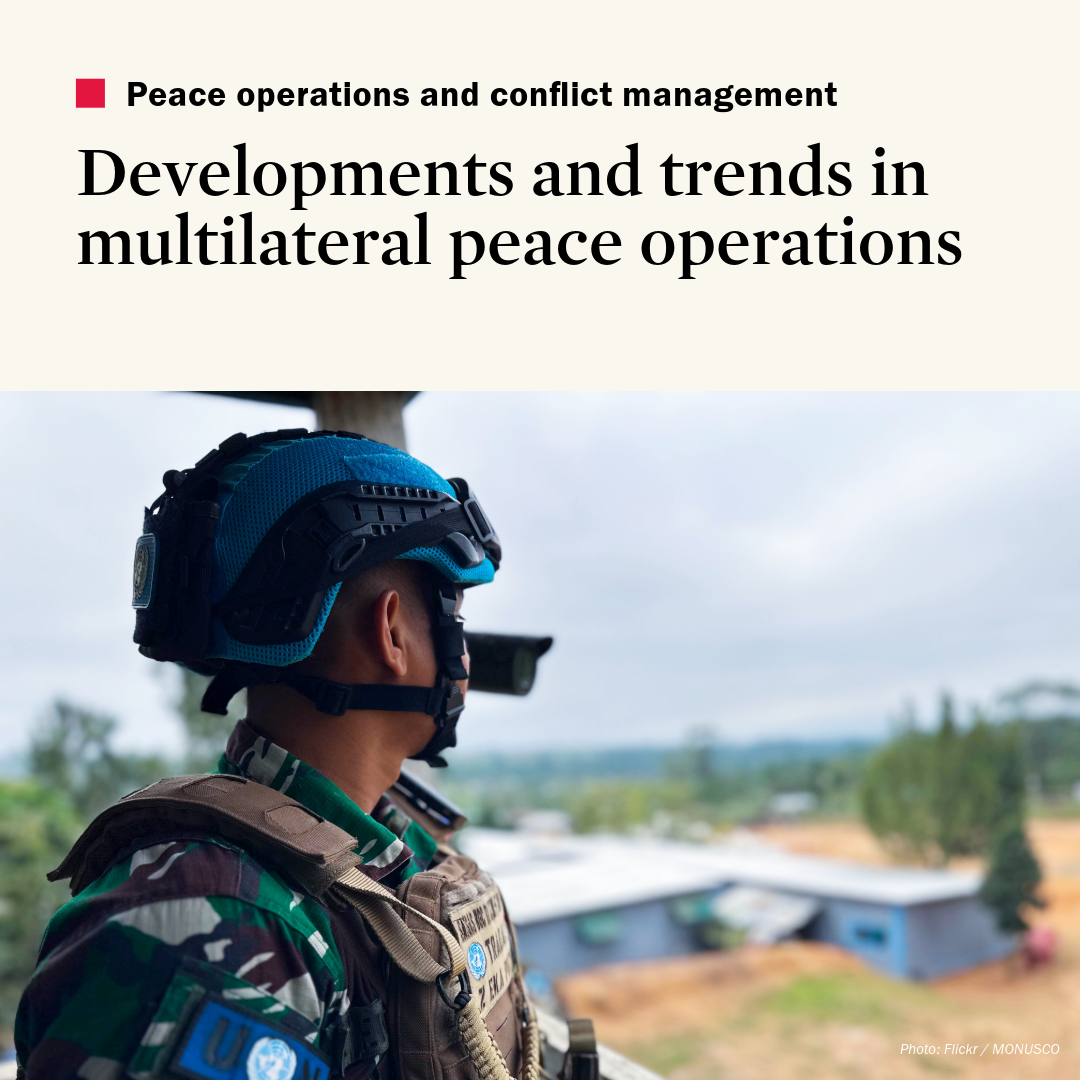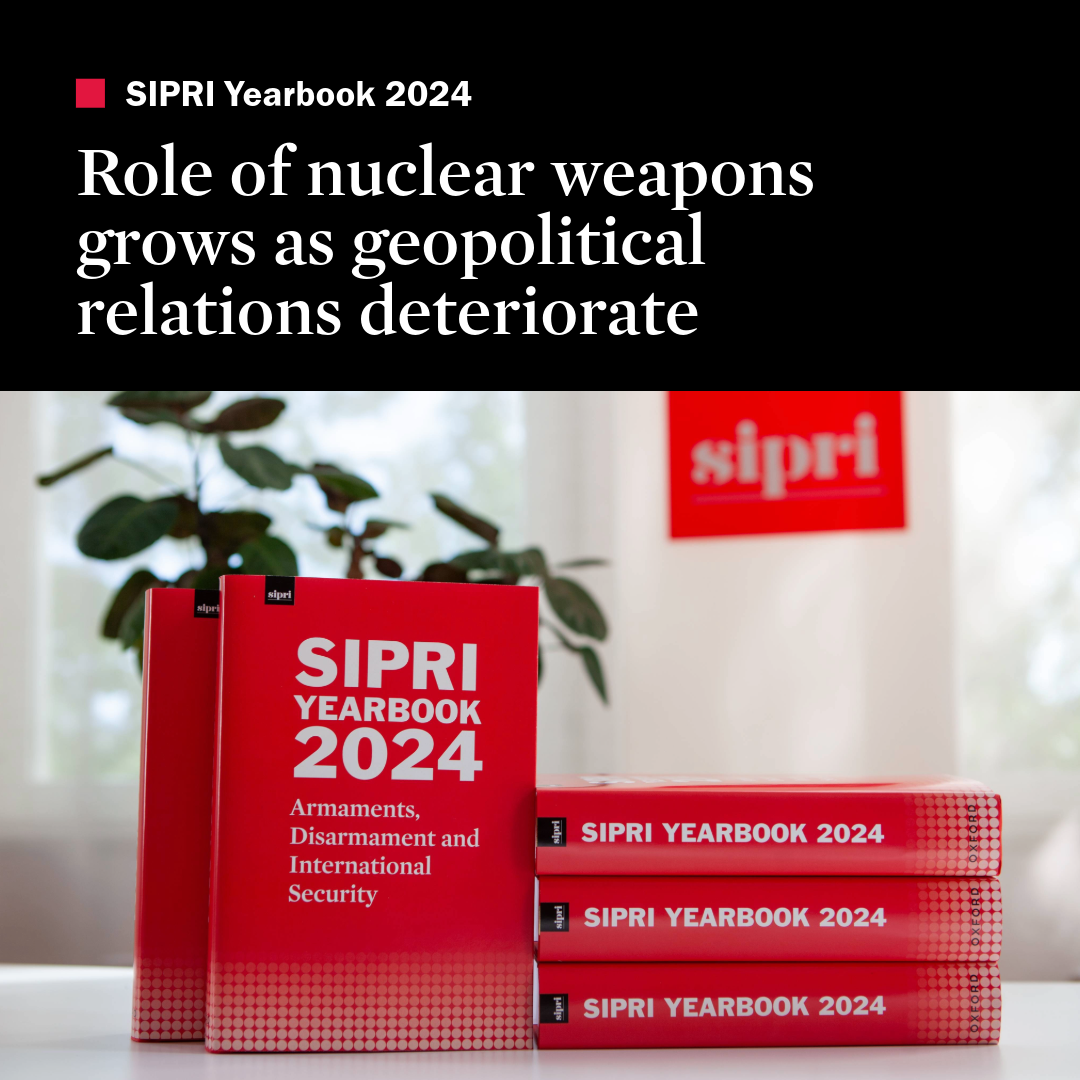News
|
 |
Deployments fall more than 40% in a decade, as geopolitical tensions and funding cuts increase pressure on multilateral peace operations
Ahead of the International Day of United Nations Peacekeepers, SIPRI released its annual analysis of trends and developments in multilateral peace operations. According to SIPRI’s analysis, the number of personnel deployed to peace operations fell by 42 per cent between 2015 and 2024, despite a rising incidence of conflict around the world. Geopolitical tensions and funding shortfalls, expected to deepen in 2025, are forcing some multilateral peace operations to downsize or close, with significant consequences for civilians on the ground.
Read more | Read the SIPRI Fact Sheet | Access the SIPRI Map of Multilateral Peace Operations | Explore the interactive map
|
|
 |
Stockholm Forum opens—a space to rethink peace and conflict resolution in the face of a shifting landscape
On 13–14 May, SIPRI hosted the 12th annual Stockholm Forum on Peace and Development, co-convened with the Folke Bernadotte Academy (FBA) and the Swedish International Development Agency (Sida). On the theme ‘The Future of Conflict Resolution and Peacebuilding’, the 2025 Forum brought together more than 400 participants from 70 countries, with a strong representation of policymakers, practitioners, civil society leaders and youth from the Global South. Over two days, participants engaged in reflection and creative discussions on how to navigate new realities to build a more secure future.
Read more | Watch the 2025 Stockholm Forum playlist
|
|
 |
SIPRI co-hosts two events on misuse of civilian AI in New York
On 7–9 May, SIPRI experts co-organized a panel and led a workshop in New York focused on addressing the misuse of civilian artificial intelligence (AI). Participants from the disarmament community, academia and education, as well as technical experts and high-level policy representatives, discussed ways to mitigate the risks civilian AI presents to international peace and security, and the role that responsible AI education can play in engaging and preparing future AI practitioners.
Read more
|
|
 |
SIPRI delivers diplomatic training course in Stockholm
On 5–8 May, SIPRI hosted a diplomatic training course on disarmament and non-proliferation for a delegation from the Ministry of Foreign Affairs of the Kingdom of Saudi Arabia. The course featured lectures and exercises led by SIPRI and invited international experts. Covering a range of issues, with a focus on the nuclear landscape, the course aimed to develop the expertise of diplomatic practitioners working in multilateral forums.
Read more
|
|
 |
SIPRI presents new report in Kinshasa on climate change and conflict
On 8 May, SIPRI presented a new report on climate change, peace and security in the eastern Democratic Republic of the Congo at an event hosted by the Swedish Embassy in Kinshasa. Drawing on the findings of the report, the event explored how climate change exacerbates insecurity and conflict in the region. Reflecting on the practical implications of these challenges, policymakers and diplomatic and civil society representatives also discussed ways for research and local engagement to inform peacebuilding practice.
Read more | Read the report
|
|
|
Upcoming events
|
SIPRI to co-host conference on Central Asia
12 June 2025
On 12 June, SIPRI and the International Tax and Investment Center will host a conference in Stockholm titled ‘Central Asia in a Changing Global Order’. Taking place at Medelhavsmuseet in Stockholm, this event will bring together renowned experts and policy representatives to discuss regional integration and cooperation in Central Asia.
Read more | Register
|
|
|
Recent events
|
SIPRI co-hosts short course on military artificial intelligence
22–23 May 2025
On 22–23 May, SIPRI and the Asser Institute hosted a short training course on international law and the governance of military technologies driven by AI. Featuring a diverse group of experts as instructors, the course aimed to address knowledge gaps and contribute to the advancement of policy processes concerning the development, use, governance and adjudication of AI-enabled military technologies.
Read more
|
|
|
|
|
 |
Mineral spoils in Ukraine: A poor foundation for peace and recovery
The agreement signed between the United States and Ukraine in April—the so-called minerals deal—presents demands that would have been unthinkable only a few months ago, overriding Ukrainian domestic legislation without offering any formal security guarantees in return. This SIPRI Essay argues that while the deal’s underlying logic is sensible in theory, the deal is predicated on short-sighted ideas that fail to create the foundations for Ukraine’s sustainable recovery and reinforce the idea that might makes right.
Read the SIPRI Essay
|
|
 |
SIPRI experts were recently featured in these external outlets:
-
‘Three decades and counting: Assessing the Oslo Accords through a security lens’, Alaa Tartir, published in De/Colonising Palestine: Contemporary Debates, eds Riccardo Bocco and Ibrahim Saïd, on 21 May 2025.
-
‘Armed rivalry: Assessing India and Pakistan’s military buildup amid renewed tensions’, Xiao Liang and Zubaida Karim, published by South Asian Voices on 21 May 2025.
-
‘Don’t let the green transition jeopardize biodiversity and equality’, Caroline Delgado, published by SIANI on 21 May 2025.
-
‘The MENA Mix: Regional Recap Podcast (April 2025)’, Charlotta Sparre and Zine Labidine Ghebouli, published by the Institute for Middle East Options on 1 May 2025.
|
|
|
Publications
|
 |
Developments and Trends in Multilateral Peace Operations, 2024
This SIPRI Fact Sheet presents the latest SIPRI data on multilateral peace operations, along with analysis of developments and trends in 2024. A total of 61 peace operations were active in 36 countries during 2024, two fewer than in 2023. Despite the number of missions remaining roughly stable over the last decade, the number of deployed international personnel has fallen significantly since 2015. Impacted by geopolitical divisions and funding cuts, multilateral peace operations are likely to continue facing difficulties in the coming years.
Read the SIPRI Fact Sheet
|
|
 |
Cloud Labs and Other New Actors in the Biotechnology Ecosystem: Export Control Challenges and Good Practices in Outreach
Advances in biotechnology and the increasingly diverse profiles of new entrants to the ecosystem pose a range of chemical and biological weapon (CBW) proliferation risks and export control challenges. Cloud laboratories (cloud labs)—fully automated, modular laboratories offered for remote use—present a new business model that requires effective export control compliance measures. This EU Non-Proliferation and Disarmament Consortium (EUNPDC) report examines the CBW risks posed by cloud labs and other new actors in the biotechnology ecosystem, recommending ways to manage these risks through outreach activities.
Read the report
|
|
 |
Lessons from the EU on Confidence-building Measures Around Artificial Intelligence in the Military Domain
Integrating AI into the military domain presents challenges that have led to a deadlock in global governance deliberations. Drawing on lessons from the European Union AI Act, this EUNPDC report examines how deliberations might benefit from a focus on risk mitigation in order to operationalize high-level principles, as well as multi-stakeholder engagement to ensure that outcomes are implementable. The report also emphasizes the role of European actors in the global governance arena around military AI.
Read the report
|
|
 |
SIPRI Yearbook 2024
SIPRI Yearbook 2024 presents a combination of original data in areas such as world military expenditure, international arms transfers, arms production, nuclear forces, armed conflicts and multilateral peace operations, with state-of-the-art analysis of important aspects of arms control, peace and international security. In addition to its detailed coverage of nuclear arms control and non-proliferation issues, the latest edition of the SIPRI Yearbook includes:
- insight on developments in conventional arms control in 2023;
- regional overviews of armed conflicts and conflict management;
- in-depth data and discussion on military expenditure, international arms transfers and arms production; and
- comprehensive coverage of efforts to counter chemical and biological security threats.
Browse the contents page | Download the summary (PDF) | Download the sample chapter on world nuclear forces (PDF) | Download the introductory chapter (PDF) | Order SIPRI Yearbook 2024
|
|
|
Vacancies
|
- Communication internship with focus on media and social media (7 June 2025)
Read more
|
|
|
|
|
Accurate, dependable information is more important than ever. Invest in the facts.
Support SIPRI
|
|
 |
| SIPRI is an independent international institute dedicated to research into conflict, armaments, arms control and disarmament. Established in 1966, SIPRI provides data, analysis and recommendations, based on open sources, to policymakers, researchers, media and the interested public. |
|
|